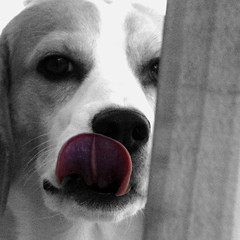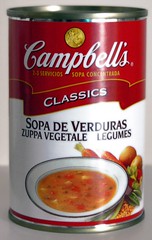Wednesday, May 31, 2006
June: A Month of Truthtelling
This will be interesting, or maybe very mundane. Not that much happens in my life. But one thing I will do is try to post an entry every day. It's all about tenacity, right? I haven't decided yet how to deal with writing about people I know, especially the few that read this blog. I'm leaning towards uncensored honesty, but won't that piss some people off, or hurt feelings? Too bad. It's what you get for knowing a writer, or at least a computer geek with a blog, and you can always post a comment to get me back. I guess the least I could do is fictionalize the names. Who am I kidding, who cares? I think only four people read this thing anyway.
Why for the month of June? So that it can be easily categorized and buried away in the archives after I return to tales of insanity, murder, and upchucked diamond rings.
Monday, May 29, 2006
Bring Into Focus
By mid-week I walk into Jefferson and stop at the first phone booth, leaf through the white pages until I find him, buried there innocuously in the hundreds of other names like an undiagnosed cancer. Wayne Sturges. I tear out the page, fold it neatly into my pocket, then walk to the hardware store for supplies. Rope, electrical tape, pliers, utility knife…Any of the tools I think could be useful.
Sturges’ house looks about as run down and uncared for as I’d expected. If the color hadn’t started out as gray, then the peeling paint and the sun and dirt had turned it that way. Rotting shutters, two of them missing like gaps in a derelict’s smile. A gravel yard overgrown with tall weeds and refuse. Rusted chain link fence. The roof sagged, a broken spine. The front steps crumbled and cracked. A desolate home for a desolate man. I opened the gate, climbed up the steps turning to sand and rock and knocked on the door. Torn screen, torn from the inside out, somebody trying to get out?
When he came to the door in his stained robe, I could tell by the expression on his unshaven face that he thought he knew me from somewhere. Guess he couldn’t place me here, a thousand miles away from where he’d first run into me.
“Sturges,” I said. Not a question, but a statement.
“Yeah.”
“I’ve come to finish the job I started six months ago.”
He recognized me now. Those bloodshot eyes opened a little wider.
“She’s just about dead now. Can hardly get anything out of her.”
“Well I come to take care of that.”
He opened the door. That threw me off a little. I’d already examined the door to judge if I’d be able to kick it in. I would have been able. He knew that too, I guess.
The room stank. Pizza boxes, opened tuna fish cans, beer bottles scattered on the floor. The television was propped on overturned milk crates, the picture flickering . Oprah. Fuzzy picture with a coathanger antenna.
I dropped my bag of supplies next to the television, grabbed the pliers and set to work on the antenna. “You know I don’t like to leave a job undone…”
“Sorry man, but I was moving out here and had to get her out of the shop. Didn’t think you could do nothing for her anyway.”
“We’ll see.” I pinched and crimped the antenna, taped on a tinfoil pie plate I’d seen on the floor, trying to work it like a shaman bringing into tune the transmissions of spirits traveling invisibly through the air, getting into the groove of my life’s work: to focus the pictures that come in blurry.
Saturday, May 27, 2006
Toy Boat
She had blonde hair, with about an inch of her bangs died black. They cut a sharp, even line across her forehead. She wore heavy eyeliner around green eyes. Her nose was pierced with a silver stud. She wore white fishnets, tall black clunky boots with silver buckles up the calves, a plaid skirt held together with oversized safety pins, and yet her rebellious clothes were betrayed by the crows-feet around her eyes that placed her somewhere in her mid-thirties. On the seat beside her rested a canvas sack with a drawstring.
He slid into the booth across from her. She sipped her coffee and peered at him from over the cup’s rim. He ordered a cup of tea from the waitress, and as she was walking away, the woman across from him asked for a bowl of barley soup.
They silently observed each other until the waitress returned with tea and soup. “There’s a story I want to tell you,” she said. He sipped his tea. “A young single-mother buys her little boy a toy boat. He plays with it in the bathtub until he grows tired of the small surface of water, the porcelain walls rising up on all sides. He asks his mother if he can float it out on the pond at the park. She says no, afraid that it might float beyond reach, and stretching to retrieve it, he would fall in and drown. He couldn’t swim. One morning when his mother had fallen asleep on the sofa while reading a book, he floods the bathroom. The boat sails from one side of the tiled floor to the other, but it bumps into the walls and the base of the sink. His mother finds him splashing in the shallows. She spanks him with a wooden spoon and sets the boat on the top bookshelf in the library, where he can only look up and see the top of the sails peeking out.
“After two weeks she gets down the sailboat. He brings it into the bath, laughing, playing the voices of pirates scrambling around on the deck. His mother sits on the toilet, legs crossed, elbow propped on knee, chin resting on the heel of her hand. She doesn’t know that he is faking this enjoyment to disarm her. He hatches a plan.
“On his way out the door one morning on the way to school, he slips the boat beneath his rain slicker. It has been raining for three and a half days. The gutters are swollen with run-off, parking lots become vast lakes of standing water. He walks to his bus stop, but as his schoolmates climb the steps into the bus, he ducks down into Mr. Olsen’s shrubs. After the bus pulls away, he climbs out of the shrubs and heads off down the sidewalk.
“Rushing rivers of water run alongside the curbs, swirling eddies of rainwater gather on the corners for intersections, whirlpools descend through sewer gratings. He sets the boat into the current. It starts off down the street, one block, two. He runs alongside it. When it gets hung up on debris, he steps into the rushing currents to lift it free. Further and further he follows his boat until he finds himself miles from home, outside of his town, somewhere off the interstate.”
He sets down his tea cup. He looks outside to the cold spring rain puddling in the street, half expecting to see a toy boat in the gutter.
“No, it’s not out there. Do you know where the boat went?”
“It kept going," he said, "for miles and miles. Every time it hung up on a branch or a piece of garbage, I freed it. It reached the Mississippi...”
“…and he ran alongside the shoreline, stumbling over driftwood, sliding down ditches, at times even falling into the banks of the river to watch his toy boat take on the greatest river in North America.”
“It stayed afloat, but I couldn’t keep up.”
“It’s lucky you scratched your name into its hull. I would never have found you.”
“Where did you find it?”
“Louisiana. My father was a croc-hunter. He found it the belly of a fifteen foot crocodile while gutting it.” She pulled out from the sack beside her the toy boat, setting it in the bowl of soup. It wasn’t deep enough to float, of course. It just sat there, lilting to starboard. He thought it might be the saddest thing he had seen in twenty years. The sails were frayed and yellowed with age. The carving of his name in the hull was warn smooth by the repeated stroke of a little girl’s fingers feeling out the name, like brail.
She laid some bills and change on the table, exactly her amount of the bill, and rose to her feet to leave. “How did you ever find your way back home?” she asked.
“I never did.”
She left. He watched her through the café window as she got into a rusted pick-up, swung around the parking lot to the exit, signaled right, then was whisked away into traffic and was gone.
Friday, May 26, 2006
Wolf in the Library
He holds the stone wall and hangs out the window, looking down to the troubled waters of the mote. Ripples swallowed her whole, like the water creature purported to lurk in the moat waters. She was never found. Lept from a library window into eternity, and why? This question would plague him in the morning hours after sunshine had replaced the dream and his finance was back at his side, obliviously leafing through the Sunday ads. He wondered about the sound that had come from his throat when he tried to shout out to her. Low gutteral growl. The thick black pelt covering his arm reaching out to snatch her from the window. The claws that had only grasped the space from which she had escaped him into death.
He returned to his newspaper. Just a dream. His uncle wouldn’t think so. Uncle Theo, the eccentric of the family, famed parascientist who had written two treatise on dream encounters and their very real impact on a person’s psychic fabric. Maybe he would go out to Hedonshire this afternoon to consult with his uncle, look up the dream symbols in his library of the occult.
Tuesday, May 23, 2006
Strange Fruit
I was watching the Bob Dylan documentary “No Direction Home” and saw a clip from Billie Holiday singing Strange Fruit. I had never heard this before. Reading the lyrics is powerful enough, but with Billie Holiday singing them, seeing her . . . it was one of those moments of terrible lucidity.
Strange Fruit
Southern trees bear strange fruit,
Blood on the leaves and blood at the root.
Black bodies swinging in the southern breeze,
Strange fruit hanging from the poplar trees.
Pastoral scene of the gallant south,
The bulging eyes and the twisted mouth,
Scent of magnolias, sweet and fresh,
Then the sudden smell of burning flesh.
Here is fruit for the crows to pluck,
For the rain to gather, for the wind to suck,
For the sun to rot, for the trees to drop,
Here is a strange and bitter cry.
Sunday, May 21, 2006
Good Boy, Scurvy
I put on dish gloves, picked the ring out of the vomit, cleaned it as best I could over the garbage can and then rinsed it off in the sink. Scurvy sat by the sink the whole time, wagging his tale, thumping against the cupboards. Yes Scurvy, good boy.
I asked the neighbor lady if she had lost a ring recently. Nope, she said, where did you find it? Well….
I keep the ring in my pocket in case I come across somebody I suspect it belongs to. Like a worry stone, I find myself running my fingers over its edges from deep inside my pockets. It started to fray the front of all my slacks. Whenever I was at a store and needed to fish out change, it would come out in the handful of coins, and I’d get a strange look from the cashier. I’d stick it back in my pocket, smile off-handedly, and take my bag and leave.
I take it out and looked at it absently while I watch television. I am not sure if it is a real diamond or what it is worth, but that doesn’t matter. Scurvy threw up against three days afterward, and I found myself picking through it to see what he’d brought me this time. Just more grass, pebbles, an undigested piece of rawhide. He wagged his tale just as enthusiastically as I cleaned up the mess. I guess the difference in value between a chewed rawhide bone and a diamond ring meant nothing to him.
I drew up a Ring Found poster and made a dozen copies at a nearby Kinko’s, then tacked them up to utility poles within a three block radius. I figure that’s about as far as scurvy gets when he runs away. Within three days I got seven calls. None of the callers could correctly describe the ring. With each made-up story I grew less and less fond of my neighbors. One woman said she had been in an argument with her boyfriend and he had torn it off her finger and thrown it away, and she’d needed stitches. Another said she had lost it while helping an elderly lady from a taxi to the front of her house. A young man said that he’d bought it to propose to his sweetheart but had thrown it from the car window after she’d turned him down. I almost wanted to give it to him, but then I would never get the ring to who it really belonged to.
A woman showed up at my front door this morning, her arms crossed over her chest as though she was cold, but it was quite warm out. She wore sweatpants and a baseball cap with wisps of hair peeking out. It looked like she was balding underneath the cap. Her eyes were sunken and her skin grey. She smiled wanly at me and said she’d heard from her neighbor that I’d found a diamond ring. She told me hers had kept slipping off of her finger lately. She looked apologetically at me, shrugged her shoulders that poked through her sweatshirt. She said she could describe it for me, and started to, but I told her no. No need to go into details. I handed her the ring, and she closed her fingers over it. She said maybe she should wear it on a necklace for now on, at least until…but she didn’t finish. Scurvy was beside the door, thumping his tail against the floor and panting. She leaned down and petted him. What’s his name, she asked? Scout, I said. Good boy, Scout.
Tuesday, May 16, 2006
Mutiny of Limbs
His hands felt terrible, having to witness the communication breakdown between the right and left foot. They’ve been through tough times themselves, but have worked it out. Multi-limbed coordinated dexterity took a lot of hard work, nobody said it would be easy. Each of the hands sympathizes with a different foot however, which leads to their own disagreements. Spats flare up, like when Henry had to pick his nose, and the left hand said “It’s your turn,” but the right hand says “I had to do it last time!” Henry is nearly exhausted by the end of the day, just keeping all of his extremities under control.
His toes felt helpless and caught in the middle of all this. The little toe thought it was to blame in some way for the feet not getting along, even though the big toe stressed that they had nothing to do with it, and kept saying that everything would be all right. But it wasn’t.
Henry woke up one morning and discovered that his right foot had up and left sometime during the night. He slid out of bed, puts on his left shoe and stares sadly at the right, leaving it cast aside on the floor. He hops around town, searching for his right foot. Finally, in a crowd on the subway platform they spot the right foot attached to the ankle of an older man. They hop madly after it, but too late: they have gotten onto a subway car and disappear into the city.
He resorts to placing an ad in the paper “Man with one left foot, seeks single white foot, approximately 8 ½ inches, preferably mild tempered, enjoys quiet evenings at home, etc…” He gets a wide variety of responses. A right foot shows up one day that used to belong to a baseball player, but that foot is too itchy. Another foot won’t stop fidgeting and spends all day tapping under the desk. Another responds to the ad is from a woman’s foot, with bright red painted nails. Henry becomes too self-conscious when he has to go barefoot. A college football hero’s foot would spontaneously decide to punt houseplants or the telephone across the room. An old man’s foot kept falling asleep. One day another left foot mistakenly shows up, but Henry is so desperate at this point that he decides to give two left feet a try. This opens him up to too many jokes about being a bad dancer.
Finally, he’s home on a weekend moping around the house with his one left foot and his two hands, which still claim they are above all of this nonsense and had seen these problems coming for years, when there’s a tap at the door. There stands his right foot, in an old athletic sock with a big hole in the heel, looking beat up and forlorn, with a stubbed toe and too long of toe nails. They begrudgingly come together again. The toes are ecstatic to see one another, and even the hands fold together complacently, saying they knew the feet would work it out eventually. Henry is so happy, he goes to put on his old shoes and pauses and thinks, this is cause for a celebration. He goes out and buys new shoes, brand new comfortable shoes with plenty of room in the toe, and a nice arch, with a light material that can breathe, and the moment his feet slip inside them he feels a completely contented feeling. His feet are home now, and in these new shoes they dance around the apartment and down the sidewalks, and he wonders how he had been so stupid as to underestimate the importance of good shoes.
Sunday, May 07, 2006
Contents Under Pressure
I might as well have been pulling the pin on a grenade. The explosion was instantaneous. My ears rung. The spray of cream blinded me. I found myself turning in circles beside the refrigerator in shock, the tab still looped around my index finger, which stung sharply and which I stared at for several moments waiting for the red to flow.
The percussion had barely died down and I was already cursing myself for how careless I had been. How many times had my mom warned me about—wait a minute: …wearing clean underwear…strange men in vans…running around the house with a Que-tip sticking out of my ear…Nope, not once did she warn me about a can of soup exploding in my face.
For the rest of my life I will cringe when opening soup. I better sign off now; I still have to wipe down the ceiling.
Friday, May 05, 2006
Budapest Nights
We were crazy during those drunken Hungarian nights, dancing in the garden, spilling wine on the hydrangeas and lilac and paprika. The entire village sat up in bed and listened to the wailing of us two boys at the moon, our chanting and singing, until the village peacekeepers made their way out the ravaged garden. A fight ensued. I'm not sure how I landed here. Mom, please get me out of this foreign jail. Through the barred window in the twilight of morning, I watch the gypsy girls scurry from the dockyards to the mule-drawn carts where their fathers wait for them, palms turned upwards, waiting for money. I watch the rats crawl from piers and back into the warehouses. I've scratched my name into the stone to ascertain my existence here, that it was not just a drunken morning hangover dream and please come get me.
What a wicked night I'd spent in a shaman’s delirium, on the edge of the Danube on a bridge that ended halfway across the water. I watch ghosts stagger out of the burning oasis of Budapest. The screams of specters still fill my nights, when I cower in bed in a cold sweat and strangling sheets, recoiling from the whirl of shadows on the wall. I had been deserted by my friend; the last I had seen him, he was lurking in the corner of a café, his gaunt face half hidden behind a fichus tree; then floating in the canal, bloated and smiling. The last I'd seen of Artaud, before he could whisper his instructions to me, was riding on the handlebars of a young girl as she pedaled oblivious down Vaci Street. By reading his purple lips I could catch his voice in my mind and the encrypted meaning of his words. They went something like this . . .
Monday, May 01, 2006
Hide in the Library
The high stone ceiling in the reference library opened up a space inside me. This was the only place that would open up my memories of my mother. The more I wrote about her on my lined notebook paper, the more her shape and form would fill in, until soon I even had down the color of her hair and the tone of her voice when she told me I had to get something done, and that she didn’t want to tell me again. But you will tell me again, mom, over and over in this reference library long after you left. Your boy is nearly grown. Perhaps by the end of this notebook I will have filled out, grown to the full height of a man, and whiskers will have sprouted downy soft on my chin. Shit. Fuck. Damn. I can say that now. You’re not here to straighten me out. No matter how much I write you back into existence, you can’t stop me from doing what I want.
I push my chair back and rise up from the table. The man peers at me over his glasses again. I flip him off. I turn and stride down the long foyer, find the back stairs, and quickly spiral down the stairwell into the lower levels of the library. Staff only allowed. I am not staff, but I need the comfort of these buried rooms. I’m tired. I want to sleep. I want to feel the weight of a ton of marble and cement above me.
A barrel-stomached man works the files in the basement. Long wisps of red hair are combed over his baldness. He sees me enter the records room, whistles to himself and stuffs a few files into a drawer, then slams it shut.
“Gonna hide out here this afternoon?”
“Maybe.”
“Maybe? Now I never did like a man of indecision. A man knows what he’s going to do and then strikes a path to get it done.”
“I just want to be left alone.”
“Then left alone you shall be. Family, friends, coworkers…nobody finds you down here. Believe me. I come down fifteen years ago, and everyone thinks I’m dead. Maybe I am.”
Why was he always being so melodramatic? And what the hell was there to file all day, anyway? I’d named him Dewey. I left him to his filing while I rested my forehead against a cool steel cabinet, imagined my skull emptying out like the great open space of the library foyer.







